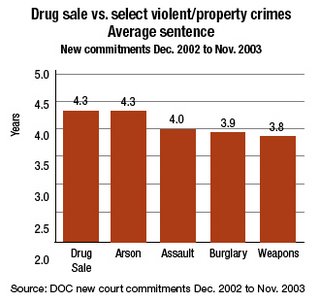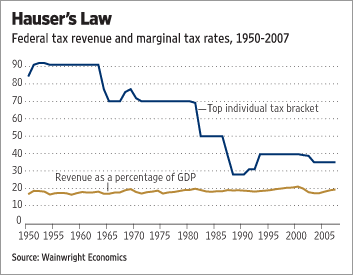What's the reward for selling Americans a little stress relief? If you're the wife of a presidential candidate with her hand in the beer trade, it can mean tens of millions of dollars. But if you're just a guy who peddles the wrong buzz-delivery system, it can be years of hard time.
Hensley & Co. is a major dealer in a popular intoxicant that was once illegal but is now enjoyed by millions of Americans. As the third-largest Anheuser-Busch wholesaler in the United States, Hensley & Co. has made company chairman Cindy McCain, Senator John McCain's wife, wealthy to the tune of about
$100 million through its network of 5,000 accounts and over 600 vehicles.
Gregory Alan Gibson allegedly spent a couple of years transporting shipments of a popular intoxicant around the United States, but not in one of Cindy McCain's trucks. Instead, according to Maricopa County, Arizona, prosecutors and jurors, he was paid $4,000, $8,000, or $12,000 at a time to drive shipments of an intoxicant that's still illegal: marijuana. Like one of Hensley's drivers (although he was certainly better-paid), Gibson drove shipments where he was told, and was paid a fee for his services.
Cindy McCain may get deluxe taxpayer-funded quarters in the White House as a partial result of the wealth and connections that come with masterminding sales of her preferred intoxicant. For transporting shipments of his preferred intoxicant, Greg Gibson has already spent years in somewhat less-splendid taxpayer-funded quarters at the
Great Plains Correctional Facility, a privately run prison that houses many of Arizona's convicted lawbreakers far from home in Hinton, Oklahoma. And a life of financial ruin along with the dodgy status of a convicted felon awaits him upon his release from prison.
Gibson became a statistic in the war on drugs on March 25, 2003 -- the day his guilty verdicts were handed down. He was sentenced to concurrent prison terms resulting in ten years behind bars, and fined $150,000 for each of twelve counts, plus surcharges of 60%.
Greg Gibson came to my attention courtesy of his fiancee, Melissa. She contacted me after reading a
post I wrote in February on the large population of non-violent drug offenders in American prisons. She wrote to me with some trepidation, concerned that corrections authorities might retaliate against Gibson for bringing his case to light -- perhaps by transferring him to a less desirable prison. The reaction of other defendants in the case, particularly those who testified for reduced sentences, was also a concern. In the end, Melissa told me that they decided to go ahead and seek whatever publicity they could get for his situation.
The crimes Gibson was convicted of consisted of Illegally Conducting an Enterprise, Conspiracy and twelve counts of Transfer for Sale, Sale or Transfer of Marijuana. There's not a crime against property in the lot -- let alone a conviction for even the most minor act of violence.
But as non-violent as his "crimes" were, and despite the fact that about a
third of Americans think the activities for which he was convicted should be perfectly legal, Gibson will be cooling his heels for a long time to come. According to the Arizona Department of Corrections
Website, Gibson won't be eligible for release until, at best, August 7, 2011. At that time, he'll owe the Arizona Drug Enforcement Fund $2,888,000 -- the total of twelve separate fines of $150,000, plus 60%.
By contrast, when Clifton Bennett, the 18-year-old son of then Arizona state
Senate President Ken Bennett, was found guilty in 2006 of
sodomizing 18 boys, he received a rather lenient
30 days in jail and three years probation, with the likelihood of no permanent criminal record.
Even people
without connections who are convicted of serious crimes get less severe sentences than Gibson did for transporting marijuana. In May of this year, Jonathan David Alldredge received
4 1/2 years in prison for shooting a man to death outside a diner in Lake Havasu City. He pleaded guilty to manslaughter.
And Nicholas David Torres was sentenced to a
3 1/2 years in prison plus five years of probation for beating an elderly man with a baseball bat.
One year is the sentence handed down to
Felipe Mazo, for killing a woman in a hit-and-run car accident.
Unfortunately, this disparity between sentences handed down for crimes of violence and abuse of minors on the one hand, and non-violent drug offenses on the other, isn't confined to Gibson's case. In
Arizona Prison Crisis: A Call for Smart on Crime Solutions (PDF), a report prepared in 2004 for Families Against Mandatory Minimums, authors Judith Greene and Kevin Pranis point out that Arizona has the highest incarceration rate in the western U.S. and the ninth highest rate in the country.

Why? Well, according to Greene and Pranis, "Arizona’s high incarceration rate is driven by a rigid mandatory sentencing system that severely restricts judges’ discretion in imposing sentences and crowds prisons with non-violent substance abusers." A
majority of Arizona's prisoners, they write, are non-violent offenders, with one-in-five behind bars for drug offenses.
In fact, say Greene and Pranis, in Arizona "[s]entences were longer for drug sales than for many violent crimes. The average sentence imposed for drug sales (4.3 years, including marijuana sales), was longer than the average sentence imposed for assault (four years) or weapons charges (3.8 years) and the same as the average sentence for arson."
Note that these lengthy sentences for non-violent drug crimes can be handed down even for first offences. The only other arrest mentioned in Gibson's court records is one in Missouri involving the same activity that resulted in his lengthy sentence in Arizona.
As I mentioned above, Greg Gibson won't be eligible for release until 2011. The long years of his already long sentence that Greg Gibson is expected to serve behind bars can be blamed on the state's "truth-in-sentencing" statute mandating that prisoners serve at least 85 percent of their sentences. Say Greene and Pranis, "Since the law was implemented in 1994, the average time served for non-violent offenses has increased far faster than the time served by violent and other serious person offenders."
It wasn't supposed to be this way. In 1996, Arizona voters passed a ballot initiative --
that year's Proposition 200 -- mandating that non-violent drug offenders arrested for simple possession or use of an illegal drug be sent to drug treatment instead of prison for their first and second offenses. But the measure only applied to use and possession. Once a commercial aspect entered the picture, government officials were not only free, but essentially required, to impose draconian sentences.
Those long sentences for selling officially disfavored intoxicants to willing customers aren't just draconian in their effects on the lives of the convicted, they also raise questions about the integrity of the process that puts them behind bars for such sizable chunks of their lives. Melissa insists that the witnesses against Gibson were much bigger players than he and that they spun tales to please the prosecution and win reduced sentences. I have no way of testing the veracity of the witnesses' testimony, but it's clear they had strong incentive to say whatever would please the prosecutors in the case.
See this exchange between a defense attorney and a prosecution witness against Gibson and his co-defendants.
Q. All right. So, no matter what you do or say, you are not going to get more than 175 months in prison, correct?
A. Correct.
Q. And then depending on what you do and say, you may get substantially less than that, correct?
A. Yes.
Q. All right. And depending on what you do and say here and in Detroit, you theoretically could end up with probation, couldn't you?
A. Yes. ....
Q. Okay. Now, you're obligated under the terms of that agreement to provide active assistance to the United States government in good faith, true?
A. True.
Q. That's in the plea agreement, right?
A. Yes.
Q. But the person who determines whether you have done that, whether you have complied with the agreement, is, in fact, the Assistant U.S. Attorney, correct?
A. Correct.
Q. It's not the judge or somebody else, is it?
A. Correct.
Note that another witness faced a possible sentence of 20 years in federal prison and 269 years in state prison that he was trying to mitigate through his testimony. That's a lot of time behind bars that might tempt anybody to polish the truth to whatever extent is necessary to win the favor of the people holding his freedom in the balance.
Manufacturing testimony is hardly a new phenomenon. As reported ten years ago by the
Pittsburgh Post-Gazette and more recently by
Reason magazine, jailhouse networks have sprung up to sell prisoners information they need to craft credible, but false, testimony in an effort to gain reduced sentences. According to the
Post-Gazette, at least one man made hundreds of thousands of dollars selling inmates confidential data. Actual participants in a case don't need to buy information -- they already have the knowledge necessary to build a story capable of winning prosecutors' favor.
I'm not arguing that Greg Gibson is an angel. According to prosecutors in his case, he fled custody at one point and tried to bribe the bail bondsman who was sent to retrieve him.
But who can blame him?
Threatened with years of lost freedom for engaging in another victimless, but illegal, trade, Deborah Jeane Palfrey
chose to hang herself. Desperation makes people do ... well ... desperate things.
But if Gibson isn't an angel, he's not a devil either. He didn't kill anybody, nor did he molest a single child, or assault an old man, and it's hard to see why he should face fines and prison time more harsh than that given to those who did.
In fact, it's hard to justify punishing Greg Gibson at all for dealing in the means to get a buzz when Cindy McCain is rewarded so richly for doing pretty much the same thing, and on a much larger scale.
Labels: drugs and prohibition, government out of bounds







